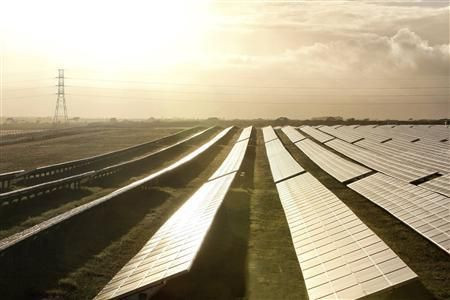Australia Lures Global Solar Battery Firms As Roll Out To Homes And Businesses Set To Gather Pace

Australia is being wooed by a slew of global solar battery suppliers ranging from Tesla Motors to LG Corp as it is gearing up to rollout the technology for domestic home and business users who are seeking power storage solutions.
As the sunniest continent, Australia’s domestic market is considered ideal for solar batteries and the market is in the size of AU$24 billion, says Morgan Stanley. It is already leading the world by putting more solar panels on roofs, and by 2040, it is expected that one in two Australian homes will be reliant on sun power.
Australia has all the criteria going in its favour in terms of expanding solar use- high sunshine, high energy prices and low financing costs. The advantage of battery storage will be that it will allow homes with solar panels to store excess electricity and reduce peak time power consumption and help in saving energy costs.
Wave of Solar Panels
Driven by Australian Government’s subsidies and falling prices, there is a wave of growth in solar panel installations and the country will be seeing rapid expansion. About 6 million Australian homes will be having solar systems by 2040, according to Bloomberg New Energy Finance.
In 2016, Tesla is planning to bring its new batteries to Australia, making it the second market after Germany, outside the U.S. Similarly, LG Chem is mulling a new battery technology to Australian homes in August, while Panasonic Corp plans to begin battery sale for Australian market in October.
"Australia has all the criteria that you would look for - high sunshine, high energy prices and low financing costs," said Michael Parker, analyst at Sanford C. Bernstein & Co in Hong Kong. He calls Australia a “good test market.”
According to estimates, solar power will see investment to the tune of $US3.7 trillion through 2040. According to Bloomberg New Energy Finance, interest in power storage will surge. LG Chem is planning to capture 30 percent of the Australian market. According to LG, the industry will grow 15-fold in the next two years to more than 30,000 storage systems. Samsung SDI Co is now testing its storage units with Australian retailers and may offer the products to customers by the end of 2015.
Growth Drivers
For Australian market, declining battery costs, surging electricity prices and falling tariffs for supplying power to the grid are driving the storage market. This is the view of the Australian Energy Market Operator. "Storage is coming," noted Panasonic's local Managing Director Paul Reid in an interview. "There may be things that impact the speed of the roll out, but it will dramatically change the landscape of the energy sector in Australia,” he said. The ability to store the energy generated by solar is a huge opportunity within this market, noted Heath Walker, Tesla's marketing manager in Melbourne.
Despite the hype, there is concern that battery storage market is still hamstrung by barriers of cost and the size of systems in terms of maintaining a reliable power source. "Everybody says it's an emerging market, but I'm not sure many people have bought batteries yet," Origin's Managing Director Grant King said in an interview. He said the premise that a wholesale migration of customers off the grid will happen because of batteries, will be a myth.
Tesla Plan
Meanwhile, Tesla is positioning its Powerwall as the first battery that provides a solution to solar energy storage with features like easy to use, easy to install, inexpensive and aesthetically appealing.
Powerwall will be targeting households and business customers who have already installed solar panels. It gives customers the benefit that energy produced during the day can be stored in the evening and early morning. Tesla is trying to exploit this technical interdependence to the hilt.
(For feedback/comments, contact the writer at k.kumar@ibtimes.com.au)





















